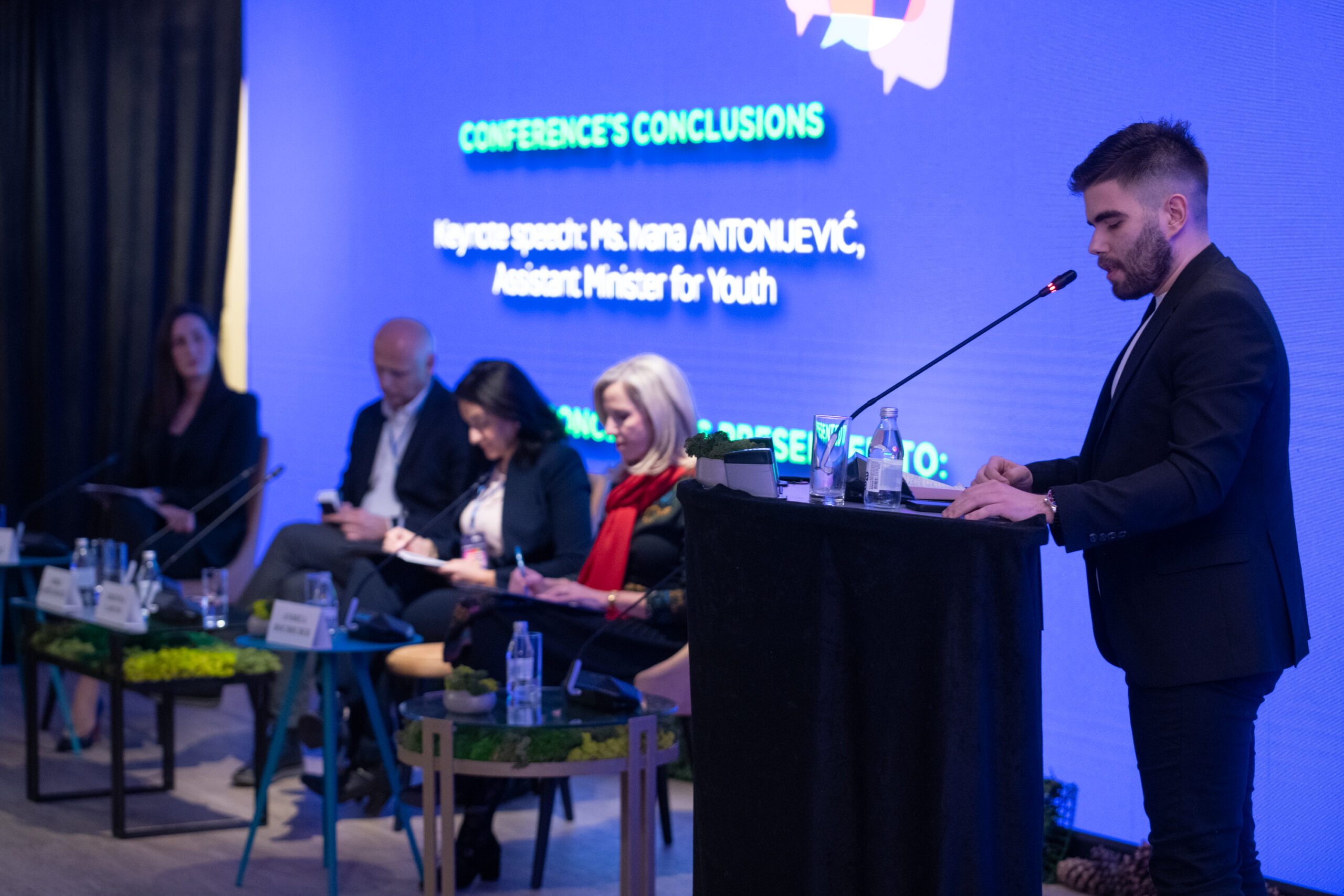Eu-Balkan Youth Forum: Young people share their vision for Europe and the Western Balkans
The second edition of the EU-Balkan Youth Forum ended on Friday in Novi Sad. Thirty young people from the EU and the Western Balkans presented their recommendations to the authorities on key issues such as regional integration and environmental protection

EU-Balkan-Youth-Forum-I-giovani-condividono-la-loro-visione-dell-Europa-e-dei-Balcani-occidentali
One of the participants presents the conclusions of his working group
The second edition of the EU-Balkan Youth Forum, held in Novi Sad, Serbia, has concluded after three days of intensive collaboration. Building from the outcomes of the first edition in Rome, the event was financed by the Italian Ministry of Foreign Affairs and International Cooperation (MAECI).
Participants worked in three thematic groups focusing on regional integration, environmental protection, and human capital development, to come up with their key conclusions.
The insights were presented to representatives of the Italian Ministry of Foreign Affairs and International Cooperation (MAECI), the EU, the Regional Cooperation Council (RCC) and the Serbian Ministry of Youth and Sport. The Forum’s conclusions will be presented at the upcoming meeting of the Working Party on the Western Balkans Region (COWEB), addressing the delegates from the 27 EU member countries.
Recommendations and proposals were discussed among authorities and spokespersons of each group, so that each party could enrich and exchange their points of view and their awareness of each topic.
The working group on Regional Integration proposes investing in research on reconciliation and past conflicts, giving full Erasmus+ membership to candidate countries, advocating for funding and recognition for National Youth Councils, establishing a Regional Youth Leadership Academy and subsidising infrastructure projects to connect WB6 territories – not only capitals and big cities, but also rural areas.
Recommendations from the Environmental Protection working group include upholding regulations for sustainable urbanisation, endorsing ecosystem restoration, promoting non-formal education strategies on sustainability, supporting inclusive decision-making, especially for young people, fostering data-driven research sharing, and enhancing public monitoring of environmental laws.
Finally, the Human Capital Development working group urges the WB6 to invest in the smart use of resources to spur economic growth and counteract brain drain. They recommend establishing mentorship programs connecting experienced EU professionals with students, creating frameworks for education improvement funds, and fostering more opportunities for practical collaboration between WB6 and EU institutions.
Participants unanimously express a keen interest in expanding opportunities for youth involvement in decision-making processes, envisioning the EU-Balkan Youth Forum as a cornerstone tool and advocating for its establishment as an annual recurring event.
The culminating moment of the forum was the presentation of these conclusions to authorities, including Ivana Antonijević, Assistant Minister for Youth, Serbia, Cristina Caputo, Deputy Director for Adriatic and Balkans, Italian Ministry of Foreign Affairs and International Cooperation, Andrea Hochhuber, Head of the European Integration and Economic section, EU Delegation in Serbia, and Amer Kapetanović, Head of Political Department, Regional Cooperation Council.
As pointed out by Hochhuber and Caputo, the recent historical decision by the European Commission to start accession negotiations with Ukraine and Moldova, besides granting candidate status to Bosnia-Herzegovina and Georgia, opens an unprecedented window for WB6. This elevates the significance of today’s young people’s recommendations.
Kapetanovic stressed that most of the regional policies implemented and facilitated by the RCC always have young people in mind. In that context, Kapetanovic reminded of the EU-funded Youth Lab Project implemented by RCC, but also of but also of the regional successes facilitated by the RCC that will contribute to improving the quality of life of young people, such as the Roaming Free Western Balkans and the reduction of roaming charges between the WB and the EU, as well as the four mobility agreements signed by the leaders of the region, which will enable the free flow of workers, professionals, students and people in general.
Antonijević emphasised the importance of raising awareness among young people about the cultural richness the Western Balkans bring to the European Union, underscoring its value alongside the benefits that EU membership offers to the region.
The recommendations of the working groups will be published on the official website of the forum , together with photos and videos of the entire event.



